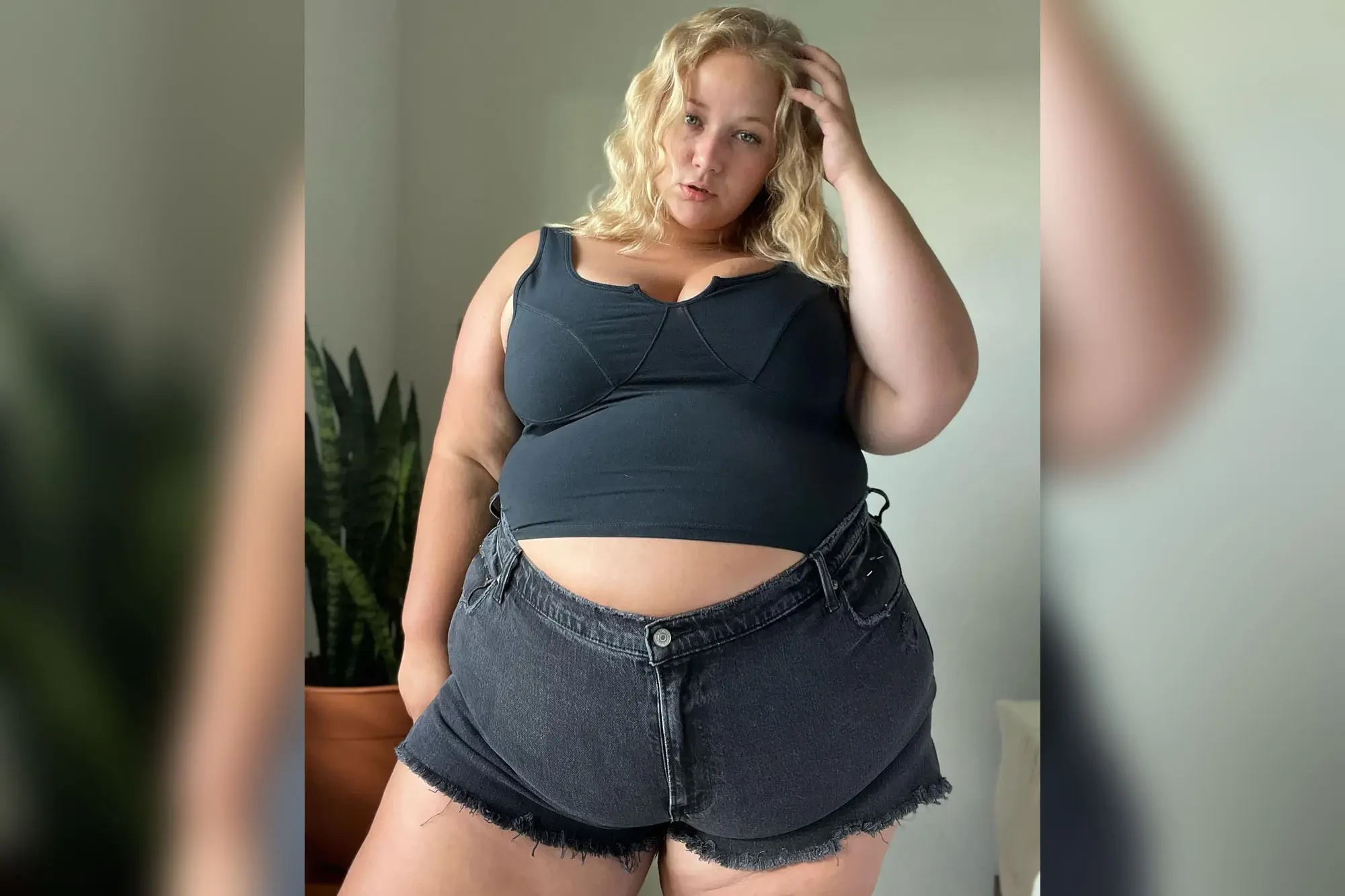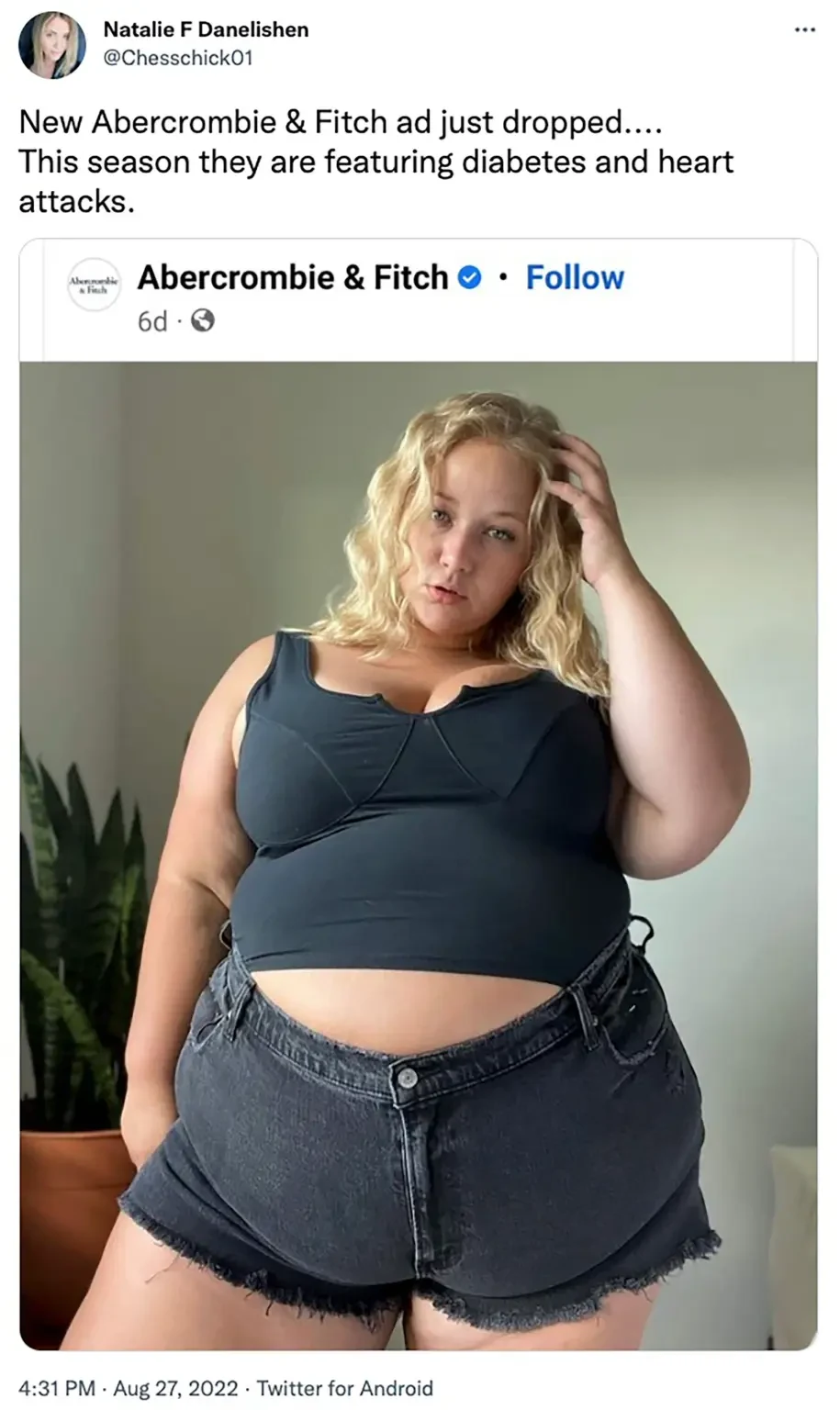- 7
- 12
Just the image of her making a pissed off  shit face AS PART OF A PARADE and then getting so shaken
shit face AS PART OF A PARADE and then getting so shaken when somebody (who is mic'd by the way the audio sounds, pretty sus. Based TLC producers?) says some shit like that lol.
when somebody (who is mic'd by the way the audio sounds, pretty sus. Based TLC producers?) says some shit like that lol.
Yeah she's totally secure with her weight even though it takes one comment like that for her to emotionally collapse like a house of cards. Puh-leeze.
- 15
- 46
The world is already having trouble feeding all the people it currently has. Fat people eat more than fit people. Assuming overweight people eat 2x fit people and obese people eat 3x here is the math.
13% of adults in the world are obese. 39% of adults in the world are overweight. One-in-five children and adolescents, globally, are overweight. - https://ourworldindata.org/obesity
7.9 billion people right now.
13% adults obese - 1.027 billion obese people ( Note- assuming same rate for children to get total percent of population same)
39% adults overweight - 3.081 billion
remaining people - 100% - ( 39% + 13%) = 48%. = 3.792 billion
Total amount of people as per food consumption increase because of fat people - 3.792 billion + ( 1.027 billion x 3) + ( 3.081 billion x 2) = 13.035 billion humans.
Fat people are causing 5.1 billion people worth of extra food consumption. They are what's causing the environment and the planet to collapse.
Note that the figures used here are actually a few years old. Already people have likely gotten way fatter.
Conclusions - Being fat is what is killing the planet. If you care about the future of humanity or saving the environment at all then you must stop being fat and convince those around you to stop being fat.
Godspeed gentlemen.
- 3
- 3
I mean think about it. Movies in the early 2000's were all seemingly having at least one scene with loads of giant crowds, even the romantic shitty ones.
Now, however, the camera is zoomed in on every single scene on the main characters to ensure they do not get too many fat people from the street into the shot.
That is what is ruining the movie experience. You can no longer take actual aesthetically pleasing wide street shots because there is always a high risk of a fat person getting into the shot and ruining it.
Here I have proof:
Top 10 US actors 2022:
Dwayne Johnson - BMI over 30
Vin Diesel - BMI 30.5
Tom Cruise - BMI 26.6
Johnny Depp - 21.5
Robert Downey Junior - 25.8
Leonardo Dicaprio - 22.4
Henry Cavill - BMI 26
Chris Hemsworth - BMI 27.7
Chris Evans - 23.1
Hugh Jackman - 25.6
Fit BMI is between 18-24.9
Already 70% of the top 10 actors of 2022 are overweight and above.
If the hollywood stars who get millions can't meet the required benchmark in the US, then what chance do the normies have.
Fat people ruined hollywood.
Already in Lord of the Rings they had to make so many hobbits and dwarves fat.
Everybody thinks it is an inclusivity issue, but honestly, are there even enough fit people around anymore who go to acting school to fill up all the roles required in a movie or TV show? I doubt it.
Conclusion - The world has become too fat for there to ever again be good TV or Movies with wide shots of streets full of people walking to and from work.

- 65
- 74
Orange site: https://news.ycombinator.com/item?id=32681241
The data are stark: the typical American diet is shortening the lives of many Americans. Diet-related deaths outrank deaths from smoking, and about half of U.S. deaths from heart disease -- nearly 900 deaths a day -- are linked to poor diet. The pandemic highlighted the problem, with much worse outcomes for people with obesity and other diet-related diseases.
"We're really in a nutrition crisis in this country." says Dariush Mozaffarian, a cardiologist and dean of the Friedman School of Nutrition Science and Policy at Tufts University
Now, there's growing momentum to tackle this problem. The Biden administration will hold the White House Conference on Hunger, Nutrition, and Health on September 28th, and will announce a new national strategy. This comes more than 50 years after a landmark White House conference which helped launch today's major federal food assistance programs.
"The 1969 conference was transformative," Mozaffarian says. The programs it ushered in, like the WIC program, have helped feed millions of low-income families.
But this hasn't been enough to solve the dual problems of food insecurity and diet-related disease. Food policy leaders say it's time to think anew and build on what we've learned. The U.S. can't "fix" hunger by just feeding people cheap, high-calorie, processed foods -- the food that's so abundant in our food supply, they say. Instead, it's got to find ways to nourish people with healthy, nutrient-dense foods.
"There's a lot of enthusiasm and thinking about food more broadly and how we can fix this crisis," Mozaffarian told NPR. He's co-chair of an independent task force that includes doctors, chefs, food policy and business experts, as well as farming and health advocates, who are helping form the agenda at upcoming the White House conference.
In a new report, they've proposed a wide-ranging set of recommendations to end hunger, advance nutrition and improve health. Here are seven big ideas they're excited about.
1. Treat food as medicine
There's a growing movement to integrate food and nutrition into health care, by providing healthy meals and groceries to patients to help prevent or manage diet-related illness.The task force wants to see this kind of work expand.
"We should pay for food-based interventions that are effective," Mozaffarian says.
For example, there's mounting evidence that providing prescriptions for fruit and vegetables can spur people to eat better and manage weight and blood sugar. The idea is for health care systems or insurers to provide or pay for healthy groceries, combined with nutrition education, to help patients change their eating habits. It is being piloted around the country.
"Produce prescription programs help improve diet quality and food security," says task force member Dr. Hilary Seligman, a food insecurity expert and professor of medicine at University of California, San Francisco, noting that they can help with diet-related diseases like high blood pressure and diabetes.
Another idea is to offer medically tailored meals aimed at helping people who are already sick reverse chronic disease. Currently the federal government is running pilot programs that let Medicaid or Medicare pay for the meals in several states.
2. Focus on quality of calories, not just quantity
The U.S. food supply is awash in cheap calories. And when you're on a tight budget or relying on benefits like SNAP (food stamps), processed foods like chips and soda can set you back less than fresh produce. Of course, eating processed foods also contributes to cardiovascular disease, stroke, diabetes and other chronic illnesses, warns Nancy Brown, CEO of the American Heart Association.
Brown says federal food assistance programs have helped to address hunger. "However, many U.S. food policies and programs focus on improving access to sufficient quantities of food," she says. Instead, it's time to modernize these policies and focus on the *quality of food, "*so people have access to enough nutritious food."
The task force wants to see food programs redesigned to nudge people towards healthier options. The report points to the GusNIP nutrition incentive program -- which, in select communities -- gives SNAP participants more money to buy fruit and vegetables. It's a similar concept to the Double Bucks program which doubles the value of SNAP benefits when used to buy produce at farmers markets and other venues.
"It is important to scale up these efforts to ensure that everyone has access to healthy food options," says task force member Angela Odoms-Young, a nutrition professor at Cornell University.
The task force recommends that Congress establish a nationwide produce incentive program for all SNAP participants. "These types of programs can help promote equity," Odoms-Young says, noting that people of color disproportionately suffer from chronic illnesses.
3. Expand access to dietary and lifestyle counseling
The Affordable Care Act mandates that diet counseling be covered by insurers as a preventive care benefit for those at higher risk of chronic disease. The exact details of who is eligible for which services are left up to an advisory group of doctors and health care providers, as well as insurers, and many patients who would benefit may not have access to this service.
"The vast majority of Americans should be getting preventative behavioral lifestyle treatment," Mozaffarian says. Too often, he says, doctors prescribe drugs for conditions before recommending or trying lifestyle changes. "Doctors go right to the drug," he says. "I think that's a big problem."
The task force recommends that Congress expand Medicare and Medicaid coverage for medical nutrition therapy to people with high blood pressure, prediabetes, celiac disease, HIV/AIDS, cancer and other diet-related conditions. It also calls for expanded coverage of cooking classes and nutrition assistance, as well as coverage of the Diabetes Prevention Program, delivered by telehealth. This behavior-change program has been shown to be more effective than medicine in reducing the onset of Type 2 diabetes among people at high risk.
4. Support food entrepreneurs
People who start food businesses can help nourish their communities and create jobs. The task force calls on the federal government to pass policies that boost new healthy food enterprises, including providing new loans and grants to food and nutrition-related companies centered on health, equity, and sustainability. The idea is to focus especially on businesses owned by people of color and other marginalized groups.
"We don't need more businesses creating diabetes and obesity," says Tambra Raye Stevenson, who runs Wanda, a non-profit group that aims to build a pipeline and platform for a million Black women and girls to become local food leaders. "We need entrepreneurs that provide teaching kitchens, community gardens, healthy food retails, wellness studios, nutrition services, healthy consumer products, and urban agricultural centers," she says.
She points to food entrepreneurs like Amanda Stephenson who opened a specialty food market in an underserved neighborhood in Washington, DC, Fresh Food Factory, and Mary Blackford of Market 7 who is planning a food hall that features Black-owned food and lifestyle businesses. "They are our food she-roes making a positive impact and providing healthy food access for our children and other women," says Stevenson.
In the lead up to next month's White House conference, groups like Food Tank, a food think tank, have organized listening sessions with food researchers and entrepreneurs. "For food to be more accessible and affordable, we need entrepreneurs that use science and technology," says Danielle Nierenberg of Food Tank. She points to innovators like Journey Foods which is helping entrepreneurs bring nutritious foods and snacks to market.
5. Increase the number of new farmers growing healthy foods using regenerative farming techniques
If all Americans began to eat the recommended amounts of fruits and vegetables each day, there would be shortages. That's because corn and soybeans are grown on most cropland in the U.S.. Now, there's growing recognition of the need for more specialty crops - including fruits, vegetables, and nuts.
The task force recommends that Congress create a Farmer Corps to support new farmers, building on the Beginning Farmers and Ranchers Development Program. The idea is to provide new farmers with paid internships and apprenticeships to learn about sustainable farming, and funding to cover a living wage and housing. It also is pushing for loans to go to farmers growing with sustainable practices.
Growing the same crop, season after season, as many farmers do, can make lands less productive over time, and deplete nutrients from the soil."The unfortunate reality is that today we subsidize conventional practices that degrade the soil,"says David Montgomery, a professor at the University of Washington and the author of What Your Food Atewho attended a listening session.
"What we need to sustain agriculture is to incentivize restoring healthy soils and train more farmers to be successful doing that," he says.
6. Make school meals free for all students
School meals have been a fixture in U.S. schools ever since President Harry Truman signed the National School Lunch Act back in 1946. For decades, the federal government has reimbursed schools for meals they serve, and low-income students can qualify for free or reduced priced meals. Research has shown that low-income children who participate have better health.
Yet, many families who are eligible for free or reduced-priced meals may not receive them, sometimes due to the paperwork, bureaucracy or stigma of participating or enrolling. Amid the pandemic, school meals have been offered for free to all students. Now, the task force says this should be a permanent change.
"Without access to free meals at school, many children go without food at all during the day, and many more do not have access to the nutritious foods they need to thrive,' says Seligman, of UC, San Francisco. She notes that school meals help not only with kids' nutrition, but they also reduce absenteeism and improve academic outcomes.
7. Establish a federal 'food czar'
In order to turn ideas like these into action, the task force recommends the creation of a new role in the federal government, a national director of food and nutrition, a food czar figure, if you will. The new director would help streamline and coordinate the many disparate efforts already underway. The U.S. government spends more than $150 billion each year on food and nutrition related programs, and the health care system also spends billions on treatment of diet related diseases.
"This spending is fragmented across 200 separate actions and 21 different departments and agencies without harmonization or synergy," the task force concludes. Now, they conclude, it's time for a new approach.
- 7
- 12
Was shopping for cots and saw this review lol
- 10
- 7
- 9
- 14
- 61
- 81
A consumer-generated image of a plus-sized woman posted to Abercrombie & Fitch's social media account ignited a debate on whether the retail company was "normalizing" obesity and unhealthy eating habits in the name of body diversity and inclusion.
The image was initially posted last week on the company's official Instagram account and went viral over the weekend, with Twitter commenters offering overwhelmingly negative reactions.
"New Abercrombie & Fitch ad just dropped.... This season they are featuring diabetes and heart attacks," tweeted Natalie Danelishen.
"She has a pretty face, too bad society told her not only was it healthy to look like this but it was also brave and empowering," wrote another Twitter user.
The company said the image was not an ad.
"Abercrombie is often tagged by our customers on social media and we love to celebrate them by reposting their images to our channels," a company spokesperson told The Post on Monday. "This is one of those occasions."
Some Twitter users defended the posting, with one commenting: “Making clothes for people who are obese is a bad thing now?”
“No,” responded one Twitter user. “But Selling obesity as sexy/ attractive is counterproductive to the medical advisors selling obesity as extremely unhealthy.”
“And if it’s not unhealthy why don’t McDonalds, KFC etc use obese people in ads? Probably because it’s not attractive enough to be assoc. w/food.”
One Twitter user accused Abercrombie of promoting health maladies.
Fashion retailers such as Abercrombie and Victoria's Secret have sought to appeal to a mass audience by eschewing advertising campaigns that have traditionally and exclusively featured thin models in favor of promotional content that touts body diversity and "body positivity."
The use of skinny models by the fashion industry sparked accusations that it was encouraging young girls and women to adopt unhealthy eating habits in pursuit of an unrealistic body type.
But critics now say that the industry is swinging too far in the other direction by featuring plus-size models.
In 2003, Abercrombie was sued by 250,000 employees who allege they were discriminated against by being forced to work in stock rooms out of view of the public while sales jobs went to those who had the "look" prized by the company.
The company, which has traditionally marketed to predominantly white college-age kids, agreed to pay $40 million to settle the class-action lawsuit.
The United States has among the highest obesity rates in the developed world. Excess weight is though to be a leading contributor to health maladies including heart disease, stroke, high blood pressure, and diabetes.
Earlier this month, Bill Maher devoted a segment of his popular weekly HBO talk show "Real Time with Bill Maher" to what he called America's transition from "fat acceptance" to "fat celebration."
https://x.com/billmaher/status/1555772246278299649
Maher said it was “disturbing” and “Orwellian” for people to disregard obesity as a health hazard.
He accused American thought leaders of “rewriting science to fit ideology to just fit what you want reality to be.”
“We’ve gone from fat acceptance to fat celebration. That’s new. That is new,” Maher said on his Aug. 5 broadcast.
“To view letting yourself go as a point of pride? We used to at least try and be fit and healthy and society praised those who succeeded.”
- 10
- 50
- CARPS_NUMBER_ONE_HATER : Carp likes booba
- 4
- 12
Probably hard to find something to wear in her size, so apparently she just recycled a tarp or whatever she could find nearby.
- 81
- 76
- 5
- 19
Aries Spears says that he can’t get passed the fact that Lizzo looks like the 💩emoji when asked about her music. pic.twitter.com/C2d4pbfDwl
— The Art Of Dialogue (@ArtOfDialogue_) August 27, 2022
- 4
- 6
Down with neurodivergence spheres!
This thread even features some fat fetishists wishing that artists would make their ponies realistically obese instead of cartoonish hamplanets.
- 37
- 74
My childhood was difficult for me and when I say difficult I don't mean it was horrible, there was always food on the table and a roof over my head. But it was rather the food on the table that was the problem. Since I was around eight years old, my entire family began to micromanage my eating. I was a thin little girl until around the age of six. My parents were always working and before my grandma moved in with us from Monday to Friday, my dad was in charge of feeding me. As a father with no cooking skills, he always chose any fast food place with a playground.
WHEN I BECAME CHUBBY, MY AUNTS BEGAN TO MAKE COMMENTS ABOUT WHAT KIND OF FOOD I WAS EATING. I WAS TOLD TO ASK FOR POPCORN WITH NO BUTTER AT THE MOVIE THEATER, TO NOT ASK FOR SECONDS. I WAS INTRODUCED TO DIET CULTURE IN THE FOURTH GRADE. I STARTED HATING MY BODY AROUND THAT AGE.
Even though comments came from other people too --- frenemies, mean boys and bullies --- it was the ones from my family which always hurt the most. But it was not until I became older that I realized almost everyone in my family was terrified of gaining weight. In reality, it was not their fault they thought this way. Society had accustomed them to believe thinness equals beauty, status, happiness. However, what my parents and family members as well as friends and ex-boyfriends did not know, is that I was beginning to obsess. I overanalyzed how I looked, what I ate and went through binge eating episodes because of it. I almost became bulimic at one point, I binge ate and made myself throw up a few times in high school. It was not until my friends reassured me I did not need to do that, I began to feel better about myself.
A girl's self esteem can be easily broken and when food becomes restricted, we almost always tend to seek it for comfort. Before I graduated college, I was on a strict keto diet which means little to no carbs. I thought I looked gorgeous because I was looking slimmer but I also thought about bread and pasta all the time.
On graduation day my aunts asked me whether I would be interested to see her nutritionist. Even though I know sometimes these comments might come from a good place, it definitely was not something I wanted to hear the day of an accomplishment.
Being worried about being fat always made me feel not good enough. I felt like I had to be funnier, likable, smarter, to make up for it. People do not really understand how this can change the way you view life. I remember when I got in a fight with my dad because he told me not to get a second helping of food, he would also try to order for me at restaurants. My mom would make comments about how I was always hungry and laugh. I tried repeatedly for them to change but to this day it is almost impossible.
It was through friends and acquaintances, I learned most of us Latinx people have been through a similar experience. And it is all because of the internalized fatphobia within our culture.
When I was 18, I was diagnosed with PolyCystic Ovarian Syndrome (PCOS), a hormonal disorder. I learned this changed my metabolism and also made me insulin resistant, which can make it difficult to lose weight. More often than not, people are already in a constant battle with their body without anyone knowing. But having to worry about whether I eat another taco or not, is not something I want to stress over.
Anna Bejarano, 30, a Mexican American elementary bilingual teacher from Texas, said she realized her mother would struggle to find clothes which fit her when younger. "It made back to school shopping something not enjoyable for me," she tells HipLatinx. Bejarano said when her mother tries to make a comment about her body she shrugs it off and challenges her by saying she will be right back and buy an elote. She never developed an eating disorder but thought about it a lot. "I guess it's damaging enough that I actually thought about wanting an eating disorder. My family relates beautiful to skinny, if someone is fat they are automatically ugly. But our weight should not define the level of beauty."
Flor Tamez, Mexican, 27, based in Texas and an accounts payable clerk, tells HipLatinx comments about her body and weight even at her lowest body weight made her develop body dysmorphia. Now, she is never sure how she feels about her looks because of the comments she's received since she was eight.
"I think it's because I've always been told that if I eat this or that I am going to gain weight, even when I've been super skinny. Growing up with those thoughts makes you feel like being overweight is shameful and therefore you might have a fear of being ridiculed," Tamez said.
Bejarano mentioned our families did not grow up with the models and body positive influencers we currently have to look up to. She believes these new role models are helping us become more accepting and I agree. Being able to see more bodies like mine in high fashion magazines or on the runway makes me feel seen. Models like Iskra Lawrence or Ashley Graham have at least given a platform to bodies like mine. She said she always tells her sister they will break the cycle when they have children and I couldn't agree more. I would never want my children, if I ever have any, to feel the way I was made to feel.
SELF ESTEEM IS A HUGE PART OF CONFIDENCE AND COMMENTS ABOUT OUR BODIES CAN BREAK IT LITTLE BY LITTLE. I TRY TO REMIND MYSELF OF THE WAYS MY BODY ALLOWS ME TO FEEL ALIVE. HOW MY THICK LEGS TAKE ME WALKING, ALLOW ME TO DANCE. MY BIG CHEEKS ARE ALMOST ALWAYS FILLED WITH A SMILE. FATPHOBIA DOES NOT ALLOW PEOPLE TO JUST LIVE AND I WANT ME AND EVERYONE TO DO JUST THAT.
- 10
- 23
How tf y’all be losing weight when y’all smoke weed?? I smoke one blunt and I’m laying down with a bag of chips, a plate of cabbage, mac n cheese & a pork chop with hot sauce, some doughnuts, grapes and a fruit roll up… Somebody lying 🤥🤔😂
— it’s a viiiiiibe all the time 🤩 (@FamousChey) August 24, 2022
- 9
- 25
Gave her that Madden 05 hit stick GYAAAAAT. pic.twitter.com/9rzsrr2s4o
— . (@Notdojaaa) August 23, 2022




















 Have a Very
Have a Very  1995 Marcia Brady
1995 Marcia Brady 

 irl
irl


















 Trans Species Okapi
Trans Species Okapi 


















 attacks
attacks 






 🦄
🦄 🐴
🐴 🐎
🐎 🎠
🎠 🦓
🦓








.webp?h=8)




 **shut up**)
**shut up**)







